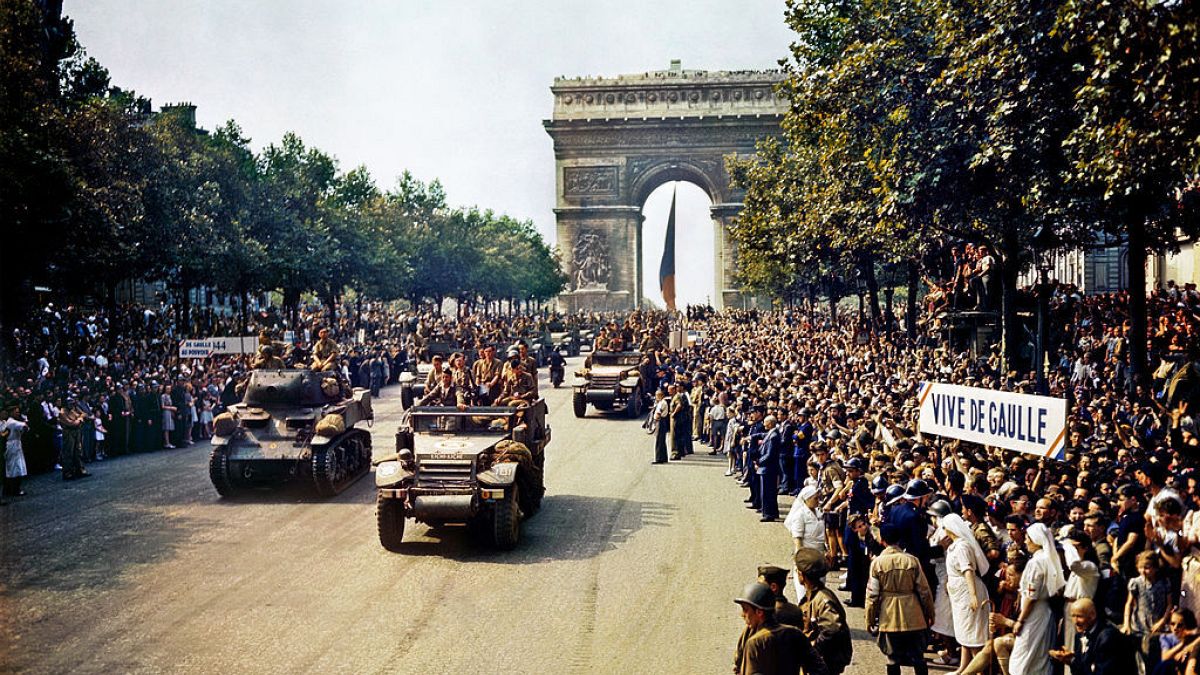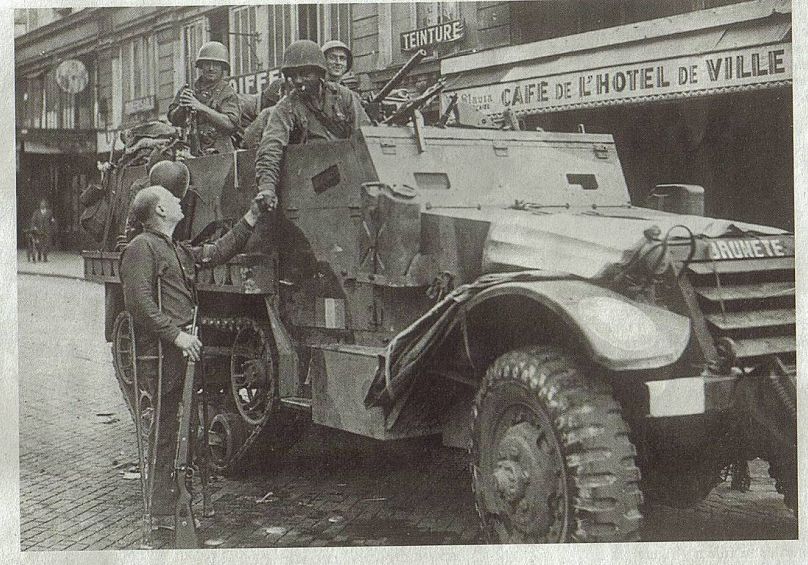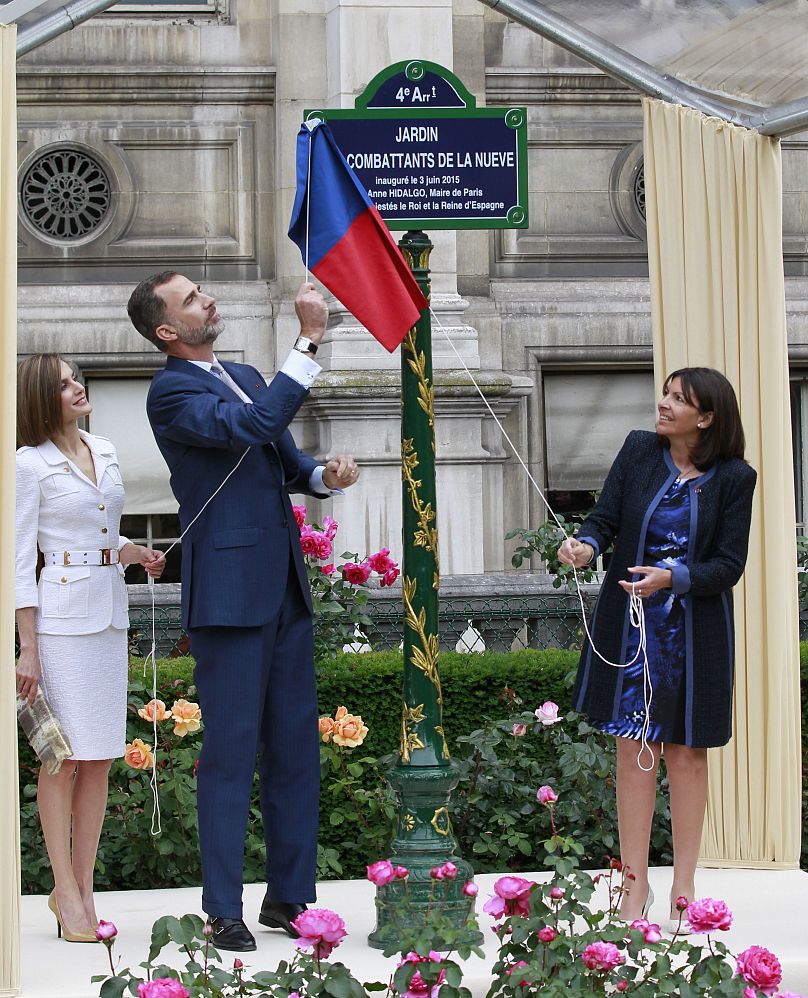Follow the journey of Amado Granell, the Spanish Republican soldier who headed the first Allied military unit to enter the Nazi-occupied French capital.
The Spanish Lieutenant Amado Granell died in 1972 in a traffic accident on his way to the French consulate in Valencia, Spain. He was going to claim his salary rights as a veteran.
It was a mundane end for a war hero: Granell headed the first Allied military unit to enter Paris and help liberate it from Nazi occupation in 1944.
Granell led a group of Spanish Republicans overlooked by the official history of the French capital's liberation.
The men of the La Nueve (9th Company of the Regiment of the March of Chad) were ordered to enter the capital through the Porte d'Italie, from the south of the city, on August 24th, 1944.
Explained: The story of Paris' liberation from the Nazis, 75 years on
The 160 men of La Nueve, who were under French command, included 146 Spaniards. They marched into Paris with military vehicles bearing the names of battles of the Spanish Civil War, such as Guadalajara, Brunete, Teruel, and Guernica.
The section of the Lieutenant Amado Granell entered the Town Hall at 20.40 hours, as he reported, where he met with the French National Resistance Council. Captain Dronne, who commanded the group, said in his memoirs that he fell asleep around two in the morning to the sound of Spanish war songs.
The forgotten heroes
The Spanish journalist Evelyn Mesquida, author of 'The Nine: The Spaniards who liberated Paris', learned the story of these soldiers in 1998 when she was studying the exile of the Spanish Republicans after the Civil War (1936-1939).
Then, she began long research on La Nueve, which was missing in the history books. "In Spain, the word republican was not even pronounced," she told Euronews.
"They were between 17 and 20 years old during the Spanish Civil War and took up arms to fight against Franco's coup d'état. They lost the war and they left to France", says the writer. After the civil war, around 500,000 Spanish Republicans crossed the Pyrenees and established refugee camps in the south of France.
But the journey had just begun for the group that would go on to help liberate Paris. Most of them were communists or anarchists, joined the legion and were sent to Algeria, Tunisia and then Morocco, where they received training with the 9th Company of the Regiment of the March of Chad.
At the beginning of August, after a stay in England, they disembarked in Normandy and advanced towards Paris to take revenge for the fascism that had reached their country.
After entering Paris on August 24, the soldiers of La Nueve were joined the next day by General Leclerc's tanks. The French capital was officially liberated on August 25.
In his first victory speech, General de Gaulle did not thank the Spanish soldiers. On August 26, in front of the Town Hall, he said: "Paris is outraged, Paris is destroyed, Paris is martyred, but Paris is liberated! Liberated by himself, liberated by his people with the help of the armies of France".
The fighters paid a high price for this military incursion: only twenty of these soldiers lived to celebrate the final victory of the Allies in Germany.
The Spanish journalist, who travelled throughout France and Spain to restore the memory of the republicans of La Nueve, had to face the surprise of the people when they were told about this episode. "They didn't know about this episode, not even the most educated," she claimed.
Better later than ever
It took 60 years for the truth to come out. In 2004, the plaques that trace the course of La Nueve were inaugurated in Paris. Six years later, the city awarded the 'Medal of the City of Paris' to the last three survivors.
In 2014, a march along the same road brought together more than 1,500 people, at the request of the association of 24 August 1944, co-founded by Mesquida. "The first soldiers of free France were Spanish," acknowledged Secretary of State Kader Arif on that day.
A year later, the garden of the Hôtel de Ville de Paris became known as the "Garden of the Fighters of the Nine". This Saturday, 75 years later, a fresco will be inaugurated in honour of the Republican soldiers in the 13th district of Paris.
Mesquida feels relieved. " I am happy for these men, I'm happy justice is done".
But most of the ceremonies have only been enjoyed by the descendants of the soldiers. Today there is only one survivor of La Nueve, Rafael Gómez, who at the age of 99 lives in Strasbourg, where he met his wife and decided to settle.
Others, such as Lieutenant Granell preferred to return to Spain under Franco's regime. He even dismissed De Gaulle's offer to be a commander of the regular army: "France is my girlfriend, but Spain is my mother," Granell said, according to his biography.


